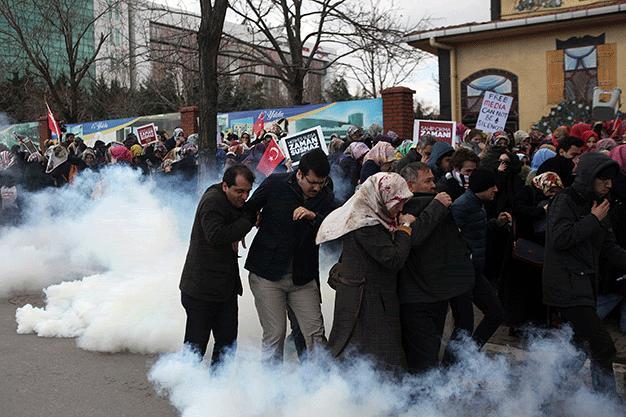Turkey leads resolution in favor of peaceful protest in Geneva
Emine Kart - ANKARA/GENEVA

AP photo
Amid growing global concerns over the deterioration of civil rights and freedoms, the Turkish government has led a resolution favoring people’s right to peaceful protest at the U.N. Human Rights Council (URC), prompting a leading human rights organization to call on Ankara to harmonize its national level of implementation with its acts in the international field.The resolution on the promotion and protection of human rights in the context of peaceful protest was adopted late last week by the HRC during their 31st session in Geneva. The resolution was the third adopted by the HRC in an initiative led by a core group of Switzerland, Turkey and Costa Rica. It is the “core group” of states which initiate, draft and table resolutions for adoption, thus Turkey was among those who initiated the resolution.
While speaking with Hürriyet Daily News, a civil society advocate group underlined that the Turkish government had been involved in the core group drafting the resolution back in June 2011, long before the anti-government Gezi Park protests in the summer of 2013.
“We welcome Turkey’s leadership at the U.N. to steer through this important resolution on human rights in protest, but this lies in stark contrast to the deterioration in respect for fundamental freedoms at the national level,” Thomas Hughes, the executive director of London-based free speech and human rights organization Article 19, told the Daily News on March 30.
“We would welcome Turkey now taking a leading role in implementing the U.N. guidance it commissioned by ensuring that its domestic laws and practices relating to protest are brought into compliance with international human rights law,” Hughes added.
The resolution enjoyed the co-sponsorship of 60 states and was adopted by a vote with increased support compared to two years ago.
“Crucially, the adopted resolution shows significant international support for efforts towards the domestic implementation of the special procedures’ report. Specifically, the resolution praises the special rapporteurs’ report as a useful tool for states fulfilling their international human rights law obligations and commitments, suggesting that the recommendations be operationalized in domestic laws, procedures and practices. It encourages the full and effective participation of all stakeholders, including civil society, in any follow-up to the report,” Article 19 said in a separate statement concerning the adoption of the resolution, which it welcomed.
Turkey is currently not a member of the HRC council of 47 member states, which are elected by the majority of members of the U.N. General Assembly through a direct and secret ballot. However, it is involved in the work of the HRC via different mechanisms such as the co-sponsorship of draft resolutions or by being a member of core groups tabling resolutions, despite not being able to vote.
Rights groups and the West have regularly criticized Ankara for its track record on human rights, yet the 28-member EU still sealed a deal with Ankara on March 18 to return all migrants and refugees reaching European shores from the Turkish coast.
The EU hopes the migration agreement, badly criticized by rights groups, would give it breathing space as it struggles to control an influx of people fleeing wars and poverty in the Middle East and beyond.
















